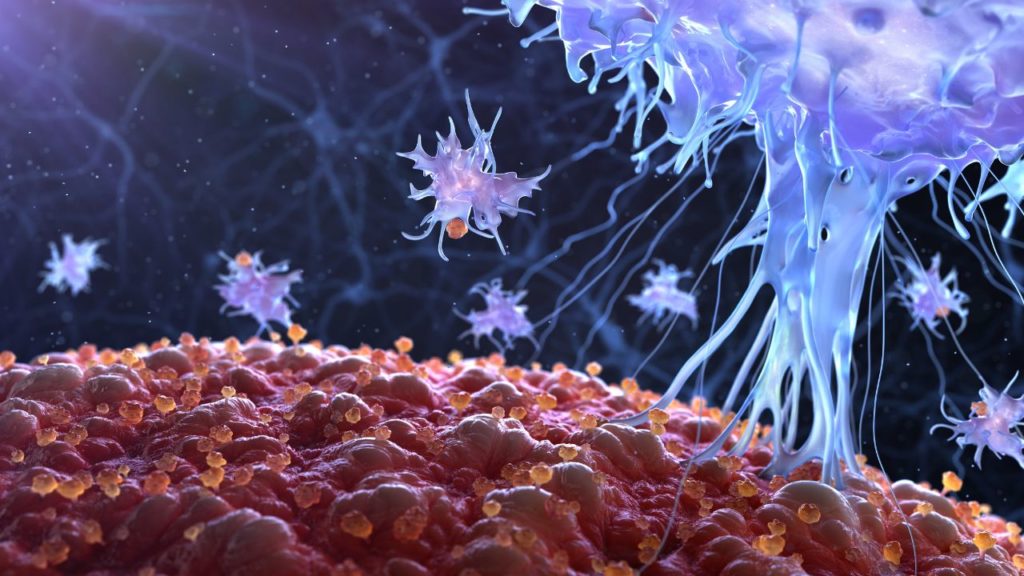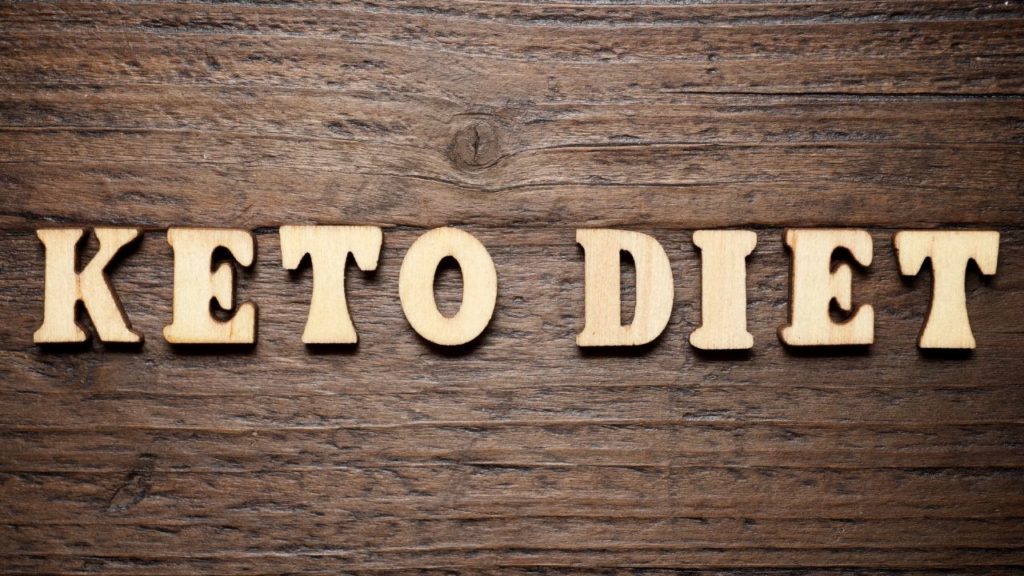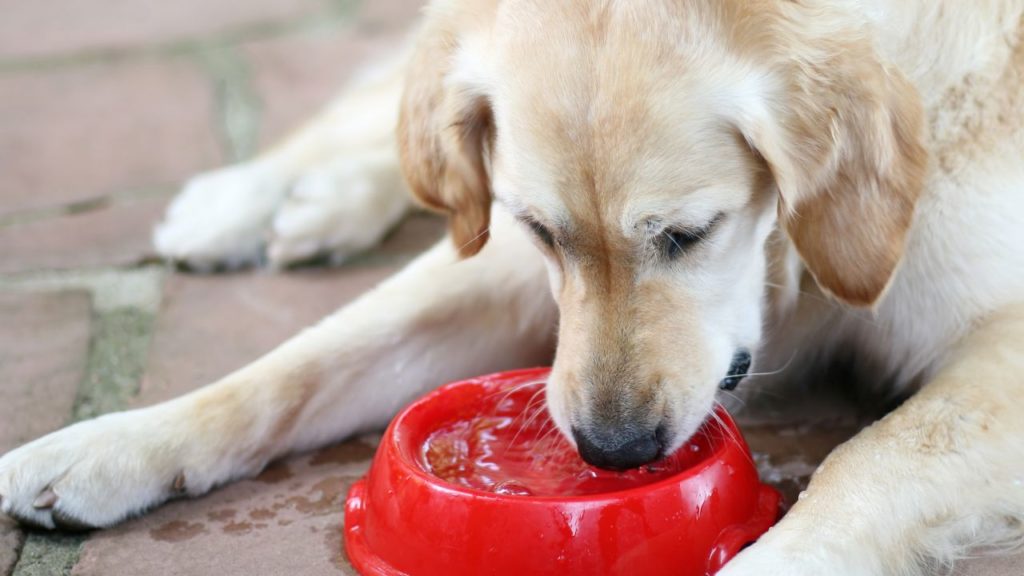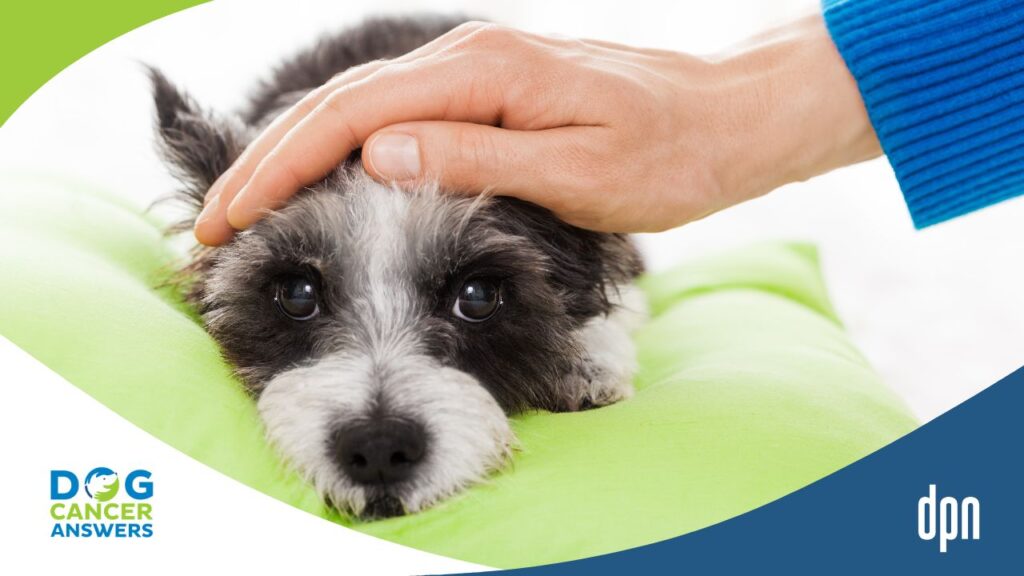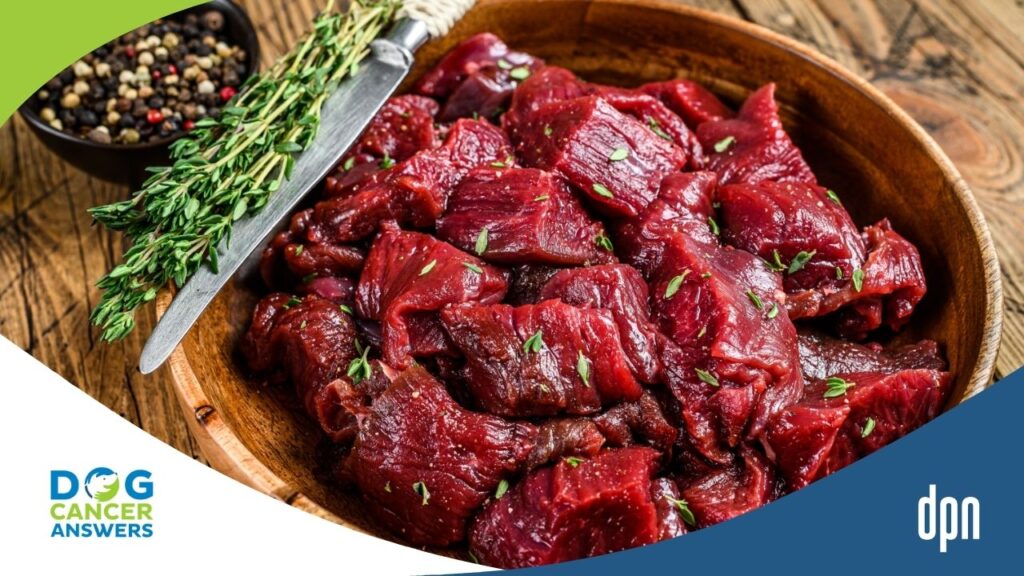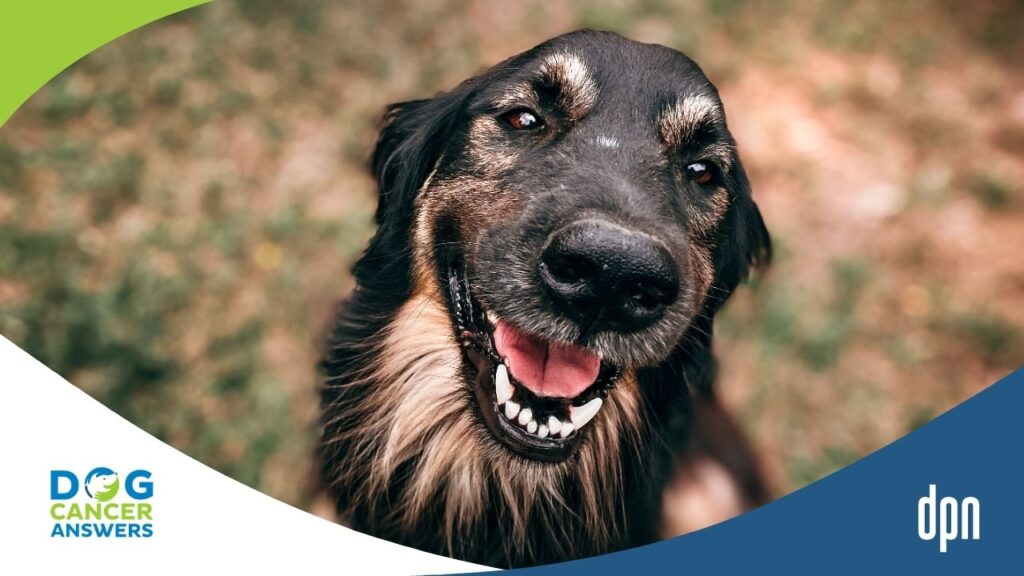EPISODE 94 | RELEASED November 2, 2020
Fight Cancer & Disease Through the Gut – Nutrition, Fleas and More | Dr. Nick Thompson Deep Dive
Dr. Nick Thompson is a holistic veterinarian in the U.K. who has tons to teach all of us about gut health, immunity, nutrition, and supplements.
SHOW NOTES
Holistic veterinarian Dr. Nick Thompson discusses a wide range of topics in this week’s episode of Dog Cancer Answers. Educating our listeners on everything from the microbiome, the science behind epigenetics and cancer gene expression, your dog’s immune system. And how you can help keep your dog flea, tick, and worm free without using all the harsh chemicals in traditional over the counter or prescription antiparasitic medications.
You will learn about your dog’s gut health. The importance of good nutrition in fighting cancer. The science behind the expression of cancer genes. A list of Dr. Nick’s favorite cancer-fighting supplements and herbs. And so much more!
Dr. Nick’s site—contains lots of other resources, recommendations, and contact info http://holisticvet.co.uk/
“Entangled Life” by Merlin Sheldrake—fungi and yeast may save us yet! https://www.merlinsheldrake.com/entangled-life
“Give Your Dog a Bone” by Dr. Ian Billinghurst, which helped Dr. Thompson turn to the raw food diet https://drianbillinghurst.com/product/give-your-dog-a-bone/
“Raw Meaty Bones” by Tom Lonsdale, precursor of the BARF diet http://www.rawmeatybones.com/book.php
Dr. John Cryan’s TED talk “Food for thought: How gut microbes change your mind” https://www.tedmed.com/talks/show?id=293045
Dr. Cryan’s book on gut bugs influencing our brains “The Psychobiotic Revolution” http://psychobiotic-revolution.com/
Dr. Nick’s recommended books on herbs http://holisticvet.co.uk/index.php/reading/reading-herbal-medicine/
The 2018 French study linking processed food intake with cancer rates in humans https://www.bmj.com/content/360/bmj.k322
The Raw Feeding Veterinary Society https://rfvs.info/ (Click under “About Us” for info about the November 2020 conference)
Answers Pet Food (US based raw food company) https://www.answerspetfood.com/
KetoPet Sanctuary (free education on ketogenic pet diet) https://www.ketopetsanctuary.com/
The Raw Feeding Veterinary Society’s public Facebook forum https://www.facebook.com/RawFeedingVets/
What is epigenetics? https://www.livescience.com/37703-epigenetics.html
Dr. Nick Thompson: The way I see it is that everybody has cancer all the time. It’s just like a game of Space Invaders. You’re Choo, choo, choo. You’re shooting down the cancer cells every single day, very effectively. You see the problem manifest because your immune system has taken its eye off the ball and the cancer has managed to get hold.
Announcer: Welcome to Dog Cancer Answers, where we help you help your dog with cancer. Here’s your host, James Jacobson.
James Jacobson: Joining us from across the pond is Dr. Nick Thompson. Dr. Thompson is a practicing holistic veterinarian in the city of Bath in England. He has written several articles for magazines such as ‘Dogs Today,’ ‘Your Dog Magazine,’ and ‘Natural Instinct.’ He is also the co-founder of the Raw Feeding Veterinary Society.
Sounds like a great resume, huh? Well, wait until you hear all the great information that he brings to today’s show about restoring your dog’s gut health to help them fight cancer and disease. We’re gonna get a quick lesson on epigenetics and he’s sharing some great tips on nutrition, killing pesky fleas and deworming–all without harmful chemicals.
But before we get started on today’s episode, I want to let you know that it’s sponsored by the best-selling animal health book, ‘The Dog Cancer Survival Guide: Full Spectrum Treatments to Optimize Your Dog’s Life Quality and Longevity,’ by Dr. Demian Dressler and Dr. Sue Ettinger. If your dog has cancer and you haven’t gotten your hands on a copy of this book yet, you should. The information in this book is life changing for both you and your dog. The Dog Cancer Survival Guide is available wherever fine books are sold or direct from the publisher at DogCancerBook.com, where you can instantly download the eBook for under ten dollars. Check it out at dogcancerbook.com. And now let’s dig into this Deep Dive session with Dr. Nick Thompson.
Dr. Nick Thompson, thank you for being with us today.
Dr. Nick Thompson: Oh, it’s great. Jim, it’s lovely to see you again. You were just saying that we met how long, maybe 10 years ago, was it? We had fish and chips in Bath.
James Jacobson: At least 10 years ago we had fish and chips in Bath–and you know, what surprised me is that you guys park on either side of the street, which was the thing that I was like ‘What are you doing?’ But it was–you have the coolest town. So why don’t we start there? Describe Bath for our listeners.
Dr. Nick Thompson: Bath is a really beautiful place to be. It’s very dog friendly. A lot of dog friendly bars and cafes and the parks are great. And it’s surrounded by hills, surrounded by greenery. It really is lovely.
That’s where I moved to in 2004. I met my wife and we got married in the Guildhall in Bath, And so, yeah, that’s, that’s where we set up the practice.
James Jacobson: So, anyway, I’m so glad you’re here, but when you moved to Bath, were you the only holistic vet? I mean, usually there’s an evolution from being like ‘I’m a vet’ to being ‘I’m more open to different approaches.’
Dr. Nick Thompson: I was the only, only holistic vet in Bath. I mean, Bath is not very big. It’s maybe 60,000 people. That’s off the top of my head. You can look it up on Wikipedia, I’m sure. And when I started, holistic medicine wasn’t really as such a big thing. Raw food was definitely in its infancy.
James Jacobson:] Which came first? Your interest in holistic veterinary medicine or your interest in raw?
Dr. Nick Thompson: I’ll give you a potted history. I qualified from Edinburgh University in 1992 and I did three years in Yorkshire. After about 18 months I was just a little bit disillusioned thinking, ‘I’m giving my patients, as I was taught, lots of antibiotics and steroids and kibbled food and this, this, and this. When actually that is the last thing I would take.’ I’m not averse to drugs used appropriately, but they wouldn’t be the first thing I would turn to. And here am I in first opinion practice, giving them out as first opinion. And I would like a larger, more animal friendly, more eco friendly approach.
And so I started studying homeopathy. And then a few years later I got into acupuncture and was fascinated with Traditional Chinese Medicine and acupuncture and meridians, channels, and what have you. And then, as part of the homeopathic approach, uh, one of the key concepts is to eliminate obstacles to cure, which is a wonderful thing to say.
And when I was in training for the homeopathy, one of the guys went to Australia and brought back this funny white book called ‘Give Your Dog a Bone.’ And I dismissed it as being fatty and what have you. But within a few months it certainly struck me. I don’t think I leapt out of bed one day and said ‘Ah, Eureka, that’s it! That is the answer.’
But it really struck me very profoundly that we were wrong in our feeding. Feeding ultra processed foods to cats and dogs, I think, is a travesty and something that in decades ahead they’ll look back on and say ‘Well, no wonder they had such high levels of cancer.’ And so, you know, if you’re not part of the solution, you’re part of the problem. And I didn’t want to be part of the problem. And therefore nutrition seemed to be a very, very, important path to pursue.
And so I’ve been, I’ve been pursuing and learning and I tell you, Jim, every single day, I’m learning something new about raw food.
James Jacobson: What have you learned recently that’s kind of exciting?
Dr. Nick Thompson: I’m glad you asked that. I’m reading on Audible because I’m so pressed for time these days. When I take the dog for a walk I’ll listen to an Audible book. It’s a book that your readers might enjoy, actually. It’s called ‘Entangled Lives’ by Merlin Sheldrake. Who is the son, the very gifted son of Rupert Sheldrake, who is a researcher into science that’s kind of slightly off the beaten track. And Merlin, his son, is, is taking up exactly where his father has led. And so he’s talking about fungi and yeast and their importance to the planet and to humans and to the microbiome and to solving some of the ecological problems of the future. Merlin Sheldrake paints a picture of fungi and yeast as being the new source of energy, of nutrition, of drugs, of just everything you can care to mention. It’s so exciting.
James Jacobson: We’ll definitely put a link to it. That’s a pretty ringing endorsement. How are you applying that information to how you treat and practice medicine?
Dr. Nick Thompson: It’s pretty new, really. So I’m just in the digestion process. But it is applicable in that I am becoming more and more aware of the microbiome and how important it is as a foundation in health. If your microbiome is wrong, you pretty much will never be right. You could say ‘no healthy microbiome, no health in any animal you care to mention.’
James Jacobson: Okay, let’s talk a little bit about cancer. ‘Cause you see a lot of dogs with cancer, as pretty much all vets do.
Dr. Nick Thompson: Mm, I do, yeah.
James Jacobson: What is your approach to treating cancer?
Dr. Nick Thompson: Okay. My primary approach is through nutrition because I can’t see that there’s any point in using any therapeutics, whether you use chemotherapy or surgery, herbs, supplements or whatever it might be. There’s no point if you maintain a form of nutrition which is known to contribute to cancer. I can give you some stats or some background to that. But the fundamental story is: If you feed ultra processed, kibbled food, which is what most of us are encouraged to do, I think that that contributes to cancer. So if you’re going to treat a disease, I think the place to start is at the roots. Not just trimming the highest branches.
James Jacobson: So what do you recommend when you diagnose a dog with cancer? Is it specific to the type of cancer or is this basically an approach that you use–
Dr. Nick Thompson: It’s universal. And that’s one of the beauties of this –is it’s so easy. The first thing to do would be to go onto a raw food diet. Now in the States, you’ve got some great companies. The one that I know about personally is called Answers Pet Food. They’re a great bunch. They’re doing some really lovely foods.
Um, there are other food companies, but I don’t really know them. I know all the companies in the UK because I’ve worked with them all.
The first thing is get off kibble. I’ve got a list of eight reasons why kibble is contributory to cancer, but in a nutshell–We are feeding carnivores like omnivores. We’re not feeding a species-appropriate diet. Kibble is made of 30 to 60% grain, and that is inappropriate for an animal that’s designed to fundamentally eat carcasses and a bit of horse poo, sheep poo, goat poo, and rabbit poo and berries when they’re in season. That’s really what dogs eat and you can’t really argue that.
So from the off, kibble is is inappropriate.
There’s a study that the National Health Service over in the UK quote. It’s a 2018 study out of Paris. And they quote to say that for every 10% increase in ultra processed food–which is kibble–for every 10% increase in a human diet of ultra processed food, you will see a 12% overall increase in cancers across the board. And what do humans do? We feed 100% ultra processed food every single day. And then we wonder why we’ve got a 50% cancer rate in our dogs.
Let me tell you a little bit more about why I don’t like kibble. Because it contains a lot of carbohydrate, which is broken down into sugars. And we know that sugars are primarily metabolized by tumors. So if you want to feed a tumor, feed lots of grain broken down to sugar. So I think that’s a really bad idea.
A good raw food diet is very low in carbohydrate and the carbs that do go in are mainly green vegetables, herbs, turmeric and mushrooms and all this good stuff.
For example, many of these kibble diet foods contain BHA and BHT and ethoxyquin as preservatives and these have really—they wake up the bad genes, the cancer genes. And they suppress those processes which keep the bad genes quiet. So there are epigenetic effects from feeding this totally species inappropriate ultra processed food
James Jacobson: Define epigenetics.
Dr. Nick Thompson: Epigenetics. Epigenetics is really, really fascinating.
Epigenetics is how your environment influences which gene is chosen to be expressed. The science of the expression of DNA. That is to say that we all have–the human genome is, is 20, 22,000 genes. And so you are able to express many, many genes. So you may be born with a lung cancer gene. But if you eat really well and you work on stress levels and lead a healthy life, you are less likely to express that lung cancer gene. That is epigenetics.
In the States and in the UK, up to 70% of dogs are either overweight or obese. Raw fed dogs tend to be a much better shape than kibble fed dogs because of the sugars involved. The kibbles turn into sugar, the sugars kick up the insulin, and that will promote a higher blood triglyceride.
One of the really important ones is that when you heat proteins and sugars together, which is what happens in kibbles, you can produce acrylamides. These are called advanced glycation end products, which are similar to those products found in cigarette smoke. Like acrylamide, for example.
So you’re creating really bad stuff. Only at low levels, but you’re going to be feeding it for life. So it’s just a bad idea, whichever way you look at it.
Just suffice to say, just coming off kibbled, ultra processed food is a good move for the dog with cancer. I’d say, why wait until the dog has cancer?
James Jacobson: I know that some veterinarians—well, they say ‘Yes, you should come off of kibble. You should not necessarily go straight to raw because you already have a dog with a highly compromised immune system and they may not be able to tolerate that as well. So therefore they recommend, you know, proteins. But they’re cooked or lightly cooked. Mixed with vegetables and grains and stuff like that. What are your thoughts on that dog cancer diet?
Dr. Nick Thompson: Yeah, I can live with that. As long as they come off kibble, then that’s a move in the right direction.
Again, I would say if the dog has cancer, you will have to tailor the nutrition to the, you know. How, how advanced the cancer is, how old the dog is and, and what have you.
Some older dogs–and it’s, I would say, only about two to five percent of the older dog population–need to have just lightly cooked food. They do better on lightly cooked food. I’m not a zealot. It’s just for the majority of dogs, they enjoy it more and they do better on raw food. But if, your particular dog does very well on lightly cooked food, then I’m good with that. Yeah. Really good with that.
James Jacobson: What is the distinction between raw and natural food? Cause I know that you make that distinction.
Dr. Nick Thompson: I do. Uh, raw food is basically when it hasn’t been heat processed. We could talk about that for a long time. But essentially raw is where it hasn’t been heat processed. Usually we freeze it. That eliminates all the parasites and Campylobacter, which is nice. That would be raw food.
We describe, um, raw and lightly cooked real food as being fresh food. This is the distinction. So 10 years ago it was just raw. It was either raw or kibble. Now we’re talking about raw and fresh.
James Jacobson: Do you ever get pushback from your clients who are saying ‘this is great, but this is really expensive’?
Dr. Nick Thompson: No, not really. Because a lot of the raw food manufacturers are really conscious of price and they will drop their margins such that they position themselves kind of about halfway up the quality kibble market.
Yeah. I mean, price, it’s not really that much of a problem. You know, have you seen how much chemotherapy costs these days, you know between kind of 250 to, to, well, that’s pounds. So we’re talking 300 to 2,000 dollars a month for chemotherapy. Crazy, crazy.
James Jacobson: I think the average, the quote that we see is around five to eight thousand dollars US.
Dr. Nick Thompson: A month?
James Jacobson: Well, not per month.
Dr. Nick Thompson: For a course. And food. I mean, the great thing about the food is that you’ve got to feed the dog something anyway. So let’s say you’re paying a dollar fifty a day to feed your 20 kilo Springer Spaniel. If the raw food, with all the benefits and none of the downsides, costs you extra 30 cents a day, I think that that’s the bargain of the century.
(Ad Break)
James Jacobson: Dr. Thompson has some great advice on keeping our dogs healthy through nutrition. And that seems like a really good place to take a quick break to digest–see what I just did there?–information.
Nutrition is so important in getting and keeping our dogs healthy. It’s something that Dr. Demian Dressler and Dr. Sue Ettinger talk a lot about in their best-selling book ‘The Dog Cancer Survival Guide.’ It’s available wherever fine books are sold, both online and in physical bookstores.
And if you would like to help support this podcast, pick up a copy of the book today direct from the publisher DogCancerBook.com.
You’ll see why it’s a best-seller, why tens of thousands of dog lovers all over the world consider this book their most trusted resource as they navigate the often confusingly emotional journey that is dog cancer. You can download the ebook for under 10 dollars at Dogcancerbook.com. Check it out today at dogcancerbook.com
And we’re back to our conversation with Dr. Nick Thompson.
Now I know that you started looking at raw when you were introduced to the BARF diet? What is that?
Dr. Nick Thompson: Yeah, the BARF diet. Bones And Raw Food or Biologically Appropriate Raw Food. This is the concept that Ian Billinghurst came along. Ian Billinghurst and Tom Lonsdale were the pioneers. Depending on who you talk to, people will say Tom Lonsdale had the ideas initially. He wrote the book called ‘Raw Meaty Bones’ and Ian Billinghurst picked up on this and he ran with it and it was much more kind of open and expansive with the ideas and seemed to develop the concept around the world ahead of Tom to a certain extent. They were both influential. They were both there at the beginning and they largely agree between them that it is important.
James Jacobson: Is this trend picking up steam in the UK among other veterinarians? When you speak with your colleagues and you tell them this approach, what do they say?
Dr. Nick Thompson: They’re gradually coming on board. As an example of that, I started the Raw Feeding Veterinary Society in 2014. And we started with just over a dozen vets. We’ve now got probably 200 vets, vet nurses, and vet techs from around the world. Australia, the U.S., South America, all over Europe. It’s a very exciting group.
And if anybody listening, if their veterinarian is keen on raw, then tell ’em to come and come and join us. The Raw Feeding Veterinary Society. The website is R-F-V-S-dot info. And, you know, come along and join us. On Facebook there is a public discussion group. If you go to, RFVS public discussion forum, um, that people can join in there, and, and learn and discuss raw feeding.
James Jacobson: So not just for veterinarians on the Facebook group.
Dr. Nick Thompson: We want to share this knowledge with real people. That’s not just vets. We do have a closed group for vets so that we can talk very frankly and openly with each other. But we do want to share the goodness.
Oh. And actually, can I plug a conference, a raw food conference on the 14th of November? It’s a virtual conference. And if you go to the Raw Feeding Veterinarian Society website, you will be able to find the links. It’s not expensive.
It’s a whole day jam packed. We’ve got researchers from Helsinki in Finland. We’ve got Barbara Royal from the States. We’ve got speakers from all around the world, speaking on all sorts of diverse topics. And I think it’s going to be a really, really great day. So -all of your guys are very welcome to join. And you don’t have to be a vet to join the conference. And it’s not going to be highfalutin. It’s gonna be not too academic. It’s gonna be real.
James Jacobson: Okay. And then if people are listening to this podcast after that, they can go to your website and watch the proceedings or some way to access those, right?
Dr. Nick Thompson: Yeah it’s gonna be all accessed via the Raw Feeding Veterinary Society website. Yeah.
James Jacobson: Right but I mean, if you can’t be there for the actual event–
Dr. Nick Thompson: If you can’t be there for the event, it’s all recorded. You just buy your ticket and you’ve got either a month or permanently after that. It’s a good deal.
James Jacobson: Great. We’ll definitely do that. So other than raw or fresh, what are your other approaches with your patients who have cancer?
Dr. Nick Thompson: What I do. There are three main treatments. Or four, if you like. s
So the first is raw diets and perhaps a ketogenic diet. The KetoPet Sanctuary in the States are doing some great work and they do recipes and what have you. So that’s diet. That’s–put that out the way.
So the three things that I would prescribe would be CBD. Hemp oil, that is. High cannabinoid, low THC hemp oil. Although THC is great, but it’s illegal in this country. If you can get it in California or Hawaii, then a little THC, I think it adds to the anticancer effect. But it’s illegal in the UK.
The second thing is I have a lovely mix of mushrooms called Coriolus plus, which contains Ganoderma and cordyceps and other mushrooms. So those all come together and that’s just standard. Everybody gets that.
And if I’m dealing with somebody who has immune deficiency, I will use this as well. It’s whenever they need their immune system to have a boost.
And the final thing is a very interesting combination that was discovered about 35 years ago by a London vet. It’s called CV247. Charlie Victor two four seven. And it is a combination of a special type of aspirin, which is then combined with Vitamin C, manganese, and copper. And somehow those very, very simple elements seem to come together to really boost energy levels and can have a very profound cancer support mechanism.
Added to that, I will add herbs like turmeric and Astragalus, withanania, gotu kola, all of these really wonderful herbs. We will put those into the mix as well.
Because what we’re trying to do is we’re trying to promote the immune system because if your immune system is flagging, that’s probably how the cancer got in in the first place. Because the way I see it is that everybody has cancer all the time. It’s just like a game of space Invaders. You’re choo-choo-choo. You’re shooting down the cancer cells every single day, very effectively. You see the problem manifest not because it just comes out of nowhere. It’s because your immune system has taken its eye off the ball even for a day. And the cancer has managed to get hold. So what we’re trying to do is build up that the immune system all over again.
James Jacobson: I love that quote that you stated earlier on when you were as studying holistic medicine where you said ‘eliminate obstacles to a cure.’ So that includes obviously this elimination of processed foods.
Dr. Nick Thompson: Yeah.
James Jacobson: What are the other things that you would eliminate?
Dr. Nick Thompson: I talk to people about the chemicals that they put into their dogs. So let’s go through the common ones. I think we overuse flea products. These are pesticides. And I think if your dog hasn’t got fleas or ticks, don’t use a product at all. Okay? If you put a drop of whatever it be onto your dog, you then stroke the dog and go and pick up an organic apple. That apple is no longer organic. If your dog has fleas, then fine. Do something about it. Find a minimal chemical intervention. So that would be fleas.
Worms, I think we’re over-worming. 95% of adult dogs don’t have worms, whether you worm them or not. And yet we worm them every month, every three months. We use too much product.
In order to make a decision as to what you use with these chemicals, you need to look at both sides. You need to look at the pros and the cons of using any given product.
Vaccination. I think we over-vaccinate our dogs. The World Small Animal Veterinary Association. They tell us in their vaccine guidelines, which is easily available to everybody listening. They say if you vaccinate a puppy for distemper, hepatitis and parvo at or past 16 weeks of age, that one vaccination–one, not two–that one vaccination can last a lifetime. And yet we vaccinate every year to every three years, depending on the vets , depending on the state, depending on the practice.
James Jacobson: If you had to hypothesize why that is, what would you suggest? Why is there that discrepancy?
Dr. Nick Thompson: It wouldn’t be very professional of me to give my full and frank opinion of that. But let’s just say that the vaccine manufacturers, they are in the business of selling vaccine.
James Jacobson: It’s a financial thing is what you’re suggesting. Okay. What are some other things to eliminate?
Dr. Nick Thompson: So eliminate sloth. Get out and exercise your dog as much as possible, it will do you a lot of good.There are studies to show that that increased exercise is, to a certain extent, protective against cancer. So get out and walk the dog, walk the dog, walk the dog. So there you go. Eliminate sloth.
James Jacobson: I love that. Or for our American audience, sloth.
Dr. Nick Thompson: Oh, say sloth. Get off your butts. Exactly. That’s what it’s about. Yeah.
James Jacobson: What do you wish the Nick Thompson of 30 years ago would have known when you started out?
Dr. Nick Thompson: What do I wish he’d known? I wish he’d known the diet thing. I really do. But at that stage, it was in its infancy. So you know, I think I jumped on pretty quickly, 25 years ago. So what would I say to my 21 year old self? Study the microbiome. Start studying right now.
Maybe go and get a PhD in bacteriology because I really think that we’re only scratching the surface. For example, did you know that there are studies whereby they take obese mice and they take samples from the gut and they put those into germ free mice who are normal weight. And those mice, even when they’re fed just a regular ration, will become obese. If they put the samples from skinny lines of mice into normal mice and feed them exactly the same food, they will become skinny. So your microbiome will determine your relationship with food, your kind of calorific relation, your metabolic relationship with food. And it goes even further. If they take the gut samples from an anxious mice and put them into normal but germ free mice, those mice become more anxious.
These are the studies that are going on and–
James Jacobson: It’s fascinating–
Dr. Nick Thompson: It’s massive. It’s just, it’s so incredible.
James Jacobson: That is so interesting. So what’s the takeaway, what’s the action? Okay. So we understand the microbiome is so significant.
Dr. Nick Thompson: Yup.
James Jacobson: What should we be doing for our dogs, maybe for ourselves, to enhance that microbiome? To help eliminate the anxiety and the obesity tendencies? Are there ways to fix your microbiome?
Dr. Nick Thompson: Yeah, there are. So I hate to go on but raw food is a great way. You know, feeding a carnivore as a carnivore is a great way to re-to reestablish the microbiome. Don’t be too cleanly. Allow the dog to eat bones on the dirt in the backyard or in the woods or, or what have you. I think it’s really important. I’ve actually given dogs soil. I’ve prescribed dirt to dogs. Itchy dogs, for example. You can buy these things. You can go on Amazon and you can buy soil born organisms for humans. And you can take those. And they’re very good at reestablishing the microbiome.
There’s a book called ‘The Psychobiotic Revolution’ by John Cryan. If the microbes control the brain, they control everything. And there are four known mechanisms. And there’re probably more. There are four known mechanisms whereby the bugs in your gut influence your brain. So they do control the brain. So therefore they do control everything. It’s massive. John Cryan, he’s done a few Ted talks. The guy’s brilliant. He’s a lovely avuncular Irish fellow.
James Jacobson: So I shouldn’t worry when my dog is, uh, eating weird things on our walks. Or should I? Like slugs–
Dr. Nick Thompson: Slugs is not so good because of lung worm. But if the dog is eating rabbit poo, then that’s not a major problem. If the dog is eating a little bit of soil here and there, or they eat at bones on the soil, I think that that’s not a bad thing.
What we do at my practice is we send a poo sample off to the lab every three months, just to check for worms, check for lung worm. That’s how we keep on top of those things. I’m sure there are labs in the States who are doing something similar, rather than using a pharmaceutical on a regular basis. We’re just testing.
James Jacobson: So you do it on a regular ba–three, every three months. When it comes back as ‘Oh yeah. Your dog has worms.’ Is that when you start using a pharmaceutical?
Dr. Nick Thompson: Not necessarily. The first thing I’ll say: 19 out of 20 samples are normal. For most dogs. Okay? And that’s an entire lifetime for most adult dogs. So if we do find worms, we’ve got options. I always say you can either use a pharmaceutical now, or we can do a couple of things. There’s another product called Diatomaceous Earth, which you can use as well. So what I’ll say to them is like ‘Okay, Let’s go three to five days of Vermex. It’s a blend of herbs, which helps to promote the immunity of the gut. And so make it less attractive for worms. Best used on a longterm basis rather than a treatment treatment treatment basis. But that, in combination with Diatomaceous Earth, I would use it for one week every month, say, as a preventative. Or for a week or two as a treatment. And you’d use probably a half a teaspoon per 20 pounds in body weight for the dog. Something like that. So–s
James Jacobson: Mmkay. Diatomaceous Earth is basically–it’s the ectoskeletons. It’s tiny little ground-up skeletons of—of what, I don’t know. What are the skeletons of?
Dr. Nick Thompson: They’re tiny, tiny little crustaceans that died a million years ago and filtered to the bottom of the ocean. And so they formed great big seams of muck.
James Jacobson: And so these skeletons from a million years ago can be beneficial today. That’s kind of cool.
Dr. Nick Thompson: It is very cool.
James Jacobson: Nick Thompson, this has been awesome. Thank you so much. I really appreciate your insights and your approach and, hey, it’s good to connect with you after about a decade.
Dr. Nick Thompson: It’s wonderful.
James Jacobson: We’ll do fish and chips someday, after all this pandemic stuff is over.
Dr. Nick Thompson: Absolutely, it would be lovely to see you, to welcome you back to Bath. And I’d say to all your guys listening, thank you so much.
Please do join us on the Raw Feeding Veterinary Society, rfps.info. And come to the conference on the 14th. That would be really, really fantastic. Follow me on Instagram @holisticvetUK.
Yeah, let’s, let’s keep together because there’s too many drugs out there being over used. And it’s not always for the benefit of the health of the dogs. And our dogs are so important, the only things keeping us sane, sometimes, I think.
James Jacobson: They certainly are. Nick Thompson, thank you so much for being with us.
Dr. Nick Thompson: Thank you. All the best.
James Jacobson: Wow, Dr. Nick Thompson sure gave us a lot to think about. You know, if I had to pick just one thing that resonated with me the most, it would be the idea that staying healthy doesn’t mean waiting for something bad to happen and then expecting a magical cure. It means being proactive and understanding the influence of disease and doing everything that we can to help prevent them from occurring in us and in our dogs. After all, isn’t the goal in life to improve our time on Earth while we’re here?
For access to the shownotes with links for everything Dr. Nick mentioned, and also to hear previously aired episodes of Dog Cancer Answers, please check out our website at DogCancerAnswers.com.
Also, I wanna let you now about ‘Dog Cancer News.’ If you haven’t heard about it, you should. This is a free newsletter written by the editorial team of dog lovers at DogCancerBlog. As a subscriber to the newsletter, ‘Dog Cancer News,’ you’ll get access to tips and recipes and new developments in dog cancerAnd you can sign up at this website Dogcancernews.com. Stay in the loop about everything dog cancer related and remember, the subscription is 100% free. Check it out at dogcancernews.com.
Did you hear those touchstones? They’re here to remind me to remind you that we have veterinarians on call at Dog Cancer Answers on our Listener Line. If you have questions for one of our dog cancer veterinarians, give us a call and tell us about it. We’ll make sure that your question is addressed with one of our veterinary experts. And your question might even get answered on air on a future episode of Dog Cancer Answers.
Here’s the phone number for the Listener Line to call us. (808) 868-3200. That is (808) 868-3200. It’s available 24 hours a day, seven days a week, (808) 868-3200. Or you can visit us on our website at dogcanceranswers.com.
Well, this concludes today’s Deep Dive with Dr. Nick Thopmson. I wanna thank you for being with us today. I’m James Jacobson. And from all of us here at Dog Cancer Answers and Dog Podcast Network, we wish you and your dog a warm Aloha.
Narrator: Thank you for listening to Dog Cancer Answers. If you’d like to connect, please visit our website at DogCancerAnswers.com. OR call our Listener Line at 808-868-3200
And here’s a friendly reminder that you probably already know. Our podcast is provided for educational and informational purposes only. It’s not meant to take the place of the advice you receive at your dog’s veterinarian. Only veterinarians who examine your dog can give you advice or diagnose your dog’s condition. Your reliance on the information you hear on this podcast is solely at your own risk. If you dog has a specific health problem, contact your veterinarian. Also, please keep in mind that veterinary information can change rapidly, so some information may be out of date. Dog Cancer Answers is a presentation by Maui Media in association with Dog Podcast Network.
Hosted By
SUBSCRIBE ON YOUR FAVORITE PLATFORM
Topics
Editor's Picks
CATEGORY


